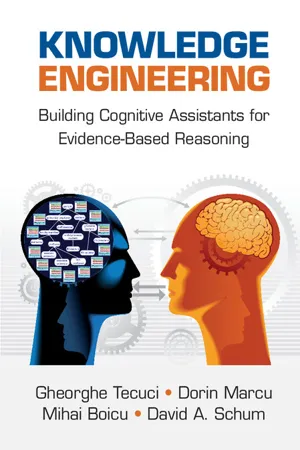
Knowledge Engineering
Building Cognitive Assistants for Evidence-based Reasoning
- English
- PDF
- Available on iOS & Android
Knowledge Engineering
Building Cognitive Assistants for Evidence-based Reasoning
About this book
This book presents a significant advancement in the theory and practice of knowledge engineering, the discipline concerned with the development of intelligent agents that use knowledge and reasoning to perform problem solving and decision-making tasks. It covers the main stages in the development of a knowledge-based agent: understanding the application domain, modeling problem solving in that domain, developing the ontology, learning the reasoning rules, and testing the agent. The book focuses on a special class of agents: cognitive assistants for evidence-based reasoning that learn complex problem-solving expertise directly from human experts, support experts, and nonexperts in problem solving and decision making, and teach their problem-solving expertise to students. A powerful learning agent shell, Disciple-EBR, is included with the book, enabling students, practitioners, and researchers to develop cognitive assistants rapidly in a wide variety of domains that require evidence-based reasoning, including intelligence analysis, cybersecurity, law, forensics, medicine, and education.
Frequently asked questions
- Essential is ideal for learners and professionals who enjoy exploring a wide range of subjects. Access the Essential Library with 800,000+ trusted titles and best-sellers across business, personal growth, and the humanities. Includes unlimited reading time and Standard Read Aloud voice.
- Complete: Perfect for advanced learners and researchers needing full, unrestricted access. Unlock 1.4M+ books across hundreds of subjects, including academic and specialized titles. The Complete Plan also includes advanced features like Premium Read Aloud and Research Assistant.
Please note we cannot support devices running on iOS 13 and Android 7 or earlier. Learn more about using the app.
Information
Table of contents
- Cover
- Half-title
- Title page
- Copyright information
- Table of contents
- Preface
- Acknowledgments
- About the Authors
- 1 Introduction
- 2 Evidence-based Reasoning: Connecting the Dots
- 3 Methodologies and Tools for Agent Design and Development
- 4 Modeling the Problem-Solving Process
- 5 Ontologies
- 6 Ontology Design and Development
- 7 Reasoning with Ontologies and Rules
- 8 Learning for Knowledge-based Agents
- 9 Rule Learning
- 10 Rule Refinement
- 11 Abstraction of Reasoning
- 12 Disciple Agents
- 13 Design Principles for Cognitive Assistants
- References
- Appendixes
- Index